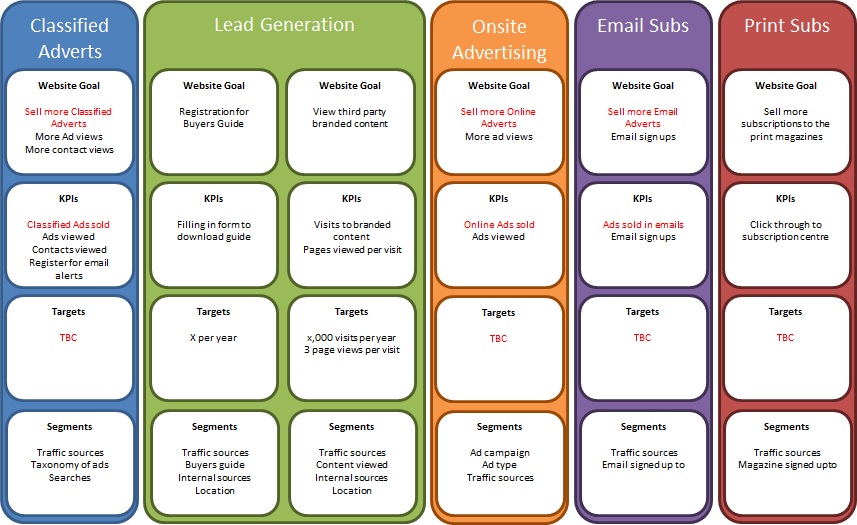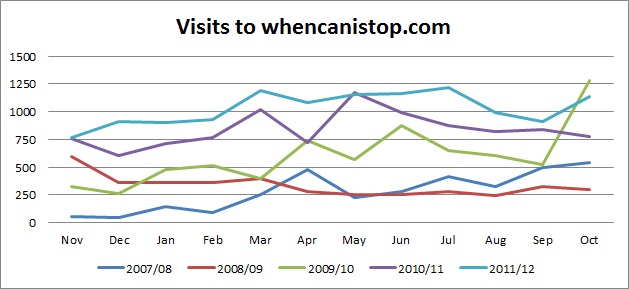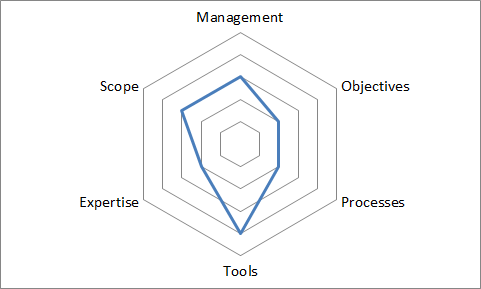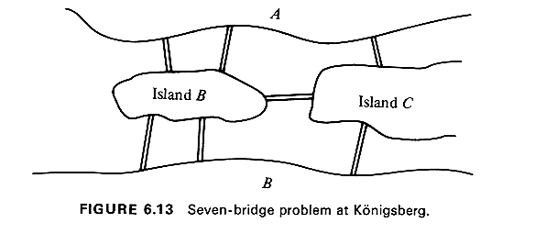The difference between Optimisation and Strategy

You’ll have noticed that there has been a lack of posts on here recently and that is been because I’ve been quite busy in the office. What have I been busy with? Well one thing that has been going on is I’ve been working on some more ‘strategic’ projects. So I thought this would be a good time for me to talk about the difference between Optimisation and Strategy.
Optimisation
As a Head of Optimisation, I suppose it should make sense to start with what optimisation is and why it is important (although if you are a regular reader of this blog, I’m probably preaching to the choir).
What we do with optimisation is very complex process that we try and simplify as much as possible to make it more palatable. We take an existing thing, work out what it is meant to be doing, what a measure of success for that is and then use as much data as we can get our hands on to make it better.
We make a measurement framework like the one above. We derive a series of ‘Business Objectives’, work out the ways that the business is making these work on the site (your business unit’s ‘critical success factors’) and then we work out the thing that shows that this is working or not – the performance indicators.
These indicators can be validated (in your more direct consumer world this is easier to do through CRMs or through market research where you don’t have those direct figures) or they can be unvalidated if you either think you know enough or if you don’t have the money to double check.
That’s all very boring, but people like me will turn up at your bosses office and produce a load of graphs showing how you are performing against the target that you’ve given yourself and you’ll all be proud about how good you are, or start making changes to see if you can become better.
If you believe some of the case studies, optimisation techniques can have dramatic effects. There are hundreds of case studies (here, here and here are just a couple) which should double digit improvements in conversion rates.
I personally worked on websites where our optimisation techniques improved conversions massively, where we came up with techniques of getting more people to do the things that we wanted based on the data that we had available and we came up with ways of increasing the volume based on search marketing techniques amongst others.
Is this stuff easy? No. It is hard, requires a lot of hard work and quite often requires lots of organisational changes. I’ve long since talked of maturity modelling to make sure that you are set up for optimisation.
These are things that you can do to set your business up to be able to do optimisation work. It looks at the processes of what you do, the people that you have to do it and the technology that they use. These are things that you should have your business set up to do, irrespective of whether you are doing an active optimisation process. When you are mature in these things then your business will be set up to succeed and the people in them will know what it is that they are doing.
This model should be set up for all of your activities when it comes to digital (and there are many in my organisation who are using this model in all sorts of channels beyond digital). Not just your conversion rate optimisation (CRO) your search engine optimisation (SEO or SEM), any email optimisation, your banner optimisation, your affiliate optimisation, your personalisation process, your A/B testing, your… etc.
This stuff is hard, takes lots of effort and will have real impact on results in the short term and in the long term on your business. If you are not doing optimsation now, you should be wondering why not and how you start doing it. And I’m not just saying that because I’m the Head of Optimisation at a consultancy (although if you do want to get in touch – there are some contact details on the left hand side).
Strategy
Strategy and Optimisation go hand in hand. Both have the same objective in the end: building the business to win.
When you do strategy, your job is different to Optimisation. Your job is to come up with the ways that will make you win the most.
When we were at school we learnt about iterative approaches to solve equations. The principle was simple – you took an equation, plugged a random couple of values into it and saw whether it was close to being true or not. When it inevitably wasn’t, you then iteratively changed some of the values until it was close to being true.
The problem with iterative approaches to equations like this is that for particularly complex equations, there is a possibility that you will iterate away from the best answer to a local high, this is a classic problem in the postman equation.
With the postman problem, you choose a way that you think is going to be the best way to get to all the houses (say starting with the two outliers and working inwards) and then iterate until you end up with the shortest route (or of course the seven-bridge problem at Konigsberg that Euler tried to solve 400 years ago).
Strategy and Optimisation effectively are an extension of the postman problem. What we’re looking at here is trying to find a way at the beginning that will allow your optimisation work to let you win. That’s an oversimplification of the process. Of course you could come up with a strategy that gets you more in a winning position to start with than a losing one could ever get you even with the best optimisation.
How do you do it? Well you do research. You do as much research as your budgets will allow you to do. You find out what your customers and prospective customers want. You segment them, find out what they want, how they are going to react to the way that you present it to them and you find out what they are doing that would make them want to use your product or service.
Then you build your product, service, marketing or target audience (or any combination of those) around them. This is the point where you build into your business objectives what it is that you want to be doing and your Optimisation expert can take over.
What you then do is carry on updating your strategy on a frequent basis as firstly your audience changes over time and secondly your competitors change over time. This is a landscaping process that means that you will always be up to date and will always be winning, rather than optimising a strategy that is no longer leading to optimal results.
And of course I’m not just saying that because I work for an organisation that does strategy projects (although if you do want to get in touch, etc, etc).





Leave a Reply